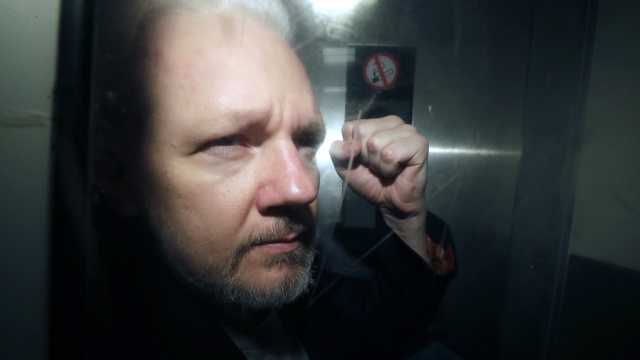A British court ruled Tuesday that Julian Assange can’t immediately be extradited to the United States on espionage charges, in a partial victory for the WikiLeaks founder.
Two High Court judges said they would grant Assange a new appeal unless U.S. authorities give further assurances about what will happen to him. The ruling means the legal saga, which has dragged on for more than a decade, will continue.
The case has been adjourned until May 20.
Judges Victoria Sharp and Jeremy Johnson said that if no assurances are filed by the U.S., they will grant Assange permission to appeal extradition on grounds including breach of freedom of expression, and because he might receive the death penalty.
“If assurances are not given then we will grant leave to appeal without a further hearing," they said. "If assurances are given then we will give the parties an opportunity to make further submissions before we make a final decision on the application for leave to appeal.”
SEE MORE: Ex-CIA employee sentenced 40 years for sharing secrets with Wikileaks
During a two-day hearing in the High Court in February, Assange’s lawyer Edward Fitzgerald said American authorities were seeking to punish him for WikiLeaks’ “exposure of criminality on the part of the U.S. government on an unprecedented scale,” including torture and killings.
Assange’s supporters have argued he is a journalist protected by the First Amendment who exposed U.S. military wrongdoing in Iraq and Afghanistan that was in the public interest. They have argued his prosecution is politically motivated and he can’t get a fair trial in the U.S.
The U.S. government said Assange’s actions went beyond journalism by soliciting, stealing and indiscriminately publishing classified government documents that endangered innocent lives.
The judges rejected six of Assange's nine grounds of appeal, but said they would grant appeal on three issues: freedom of speech, Assange's claim that he faces disadvantage because he is not a U.S. citizen, and the risk he could receive the death penalty.
U.S. authorities have promised Assange would not receive capital punishment, but the judges said it is “conceivable that the assurance might be interpreted narrowly by the respondent, so as not to preclude the imposition of the death penalty.”
SEE MORE: Wikileaks' Assange may be a suicide risk if sent to US
Assange, 52, an Australian computer expert, has been indicted in the U.S. on charges over Wikileaks’ publication in 2010 of hundreds of thousands of classified documents.
Prosecutors say he conspired with U.S. army intelligence analyst Chelsea Manning to hack into a Pentagon computer and release secret diplomatic cables and military files on the wars in Iraq and Afghanistan. Assange faces 17 espionage counts and one charge of computer misuse. If convicted, his lawyers say he could receive a prison term of up to 175 years, though American authorities have said any sentence is likely to be much lower.
Assange’s wife and supporters say his physical and mental health have suffered during more than a decade of legal battles, including seven years in self-exile in the Ecuadorian Embassy in London and the last five years in a high-security prison on the outskirts of the British capital.
Trending stories at Scrippsnews.com



